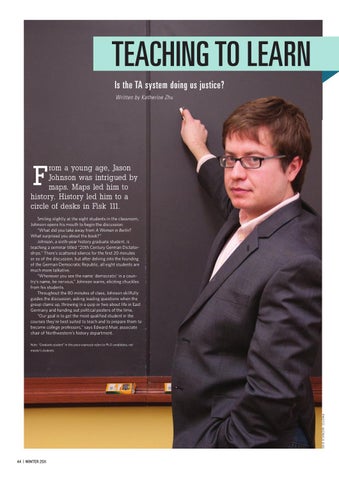TEACHING TO LEARN Is the TA system doing us justice? Written by Katherine Zhu
F
rom a young age, Jason Johnson was intrigued by maps. Maps led him to history. History led him to a circle of desks in Fisk 111. Smiling slightly at the eight students in the classroom, Johnson opens his mouth to begin the discussion. “What did you take away from A Woman in Berlin? What surprised you about the book?” Johnson, a sixth-year history graduate student, is teaching a seminar titled “20th Century German Dictatorships.” There’s scattered silence for the first 20 minutes or so of the discussion, but after delving into the founding of the German Democratic Republic, all eight students are much more talkative. “Whenever you see the name 'democratic' in a country’s name, be nervous,” Johnson warns, eliciting chuckles from his students. Throughout the 80 minutes of class, Johnson skillfully guides the discussion, asking leading questions when the group clams up, throwing in a quip or two about life in East Germany and handing out political posters of the time. “Our goal is to get the most qualified student in the courses they’re best suited to teach and to prepare them to become college professors,” says Edward Muir, associate chair of Northwestern’s history department. Note: “Graduate student” in this piece expressly refers to Ph.D candidates, not master’s students.
photo: monica kim
44 | WINTER 2011
